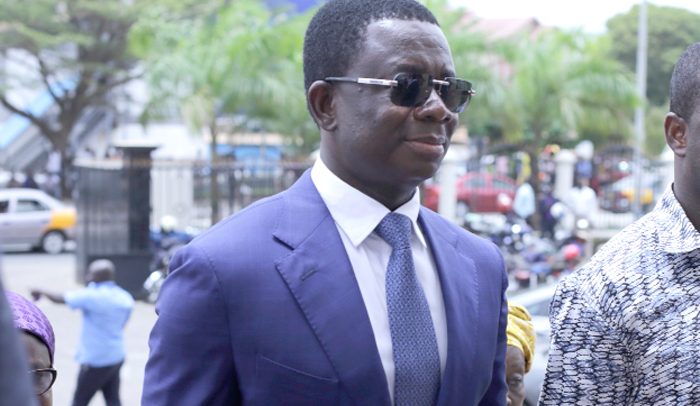Dr. Stephen Opuni
The Supreme Court has set July 28, 2021, to give a ruling on a motion for certiorari to quash the decision of an Accra High Court which excluded some exhibits in the trial of former Chief Executive Officer of Ghana Cocoa Board (COCOBOD), Dr. Stephen Kwabena Opuni.
The ex-COCOBOD boss went to the highest court challenging the exclusion of some documents tendered through the prosecution’s witnesses but excluded by the trial judge, Justice Clemence Honyenuga, a Supreme Court judge sitting as an additional High Court judge, in his ruling on Dr. Opuni’s submission of no case.
He is also seeking the court to prohibit Justice Honyenuga from further hearing the case on ground of likelihood of bias on the part of the judge.
Trial
Dr. Opuni, who is standing trial together with businessman, Seidu Agongo, and the businessman’s Agricult Ghana Limited, for allegedly causing over GH¢217 million financial loss to the state, was ordered by the trial judge on May 7, 2021, to open his defence after the prosecution had closed its case.
But he has since filed multiple applications before the court, including a stay of proceedings, one of which was filed at the Court of Appeal and was dismissed.
He had earlier filed an application before the court asking Justice Honyenuga to recuse himself from the trial.
The application was dismissed by the court, which held that it was brought in bad faith.
He also petitioned the Chief Justice (CJ) to get the trial judge to recuse himself from the trial, but the petition was dismissed by the CJ, who stated that the petition did not disclose any likelihood of bias on the part of the judge.
SC Move
Dr. Opuni is now at the Supreme Court asking the court to exercise its supervisory power to quash the part of the decision of Justice Honyenuga to exclude some exhibits in his ruling on a submission of no case filed by the accused persons.
Moving the motion yesterday, his lawyer, Samuel Codjoe, argued that the judge’s decision breached Section 6 of the Evidence Act which states that objections to evidence must be made at the time of tendering, not in a ruling on submission of no case.
He said the decision constituted a breach of natural justice as it did not give the accused person the opportunity to be heard when it sought to reject those documents.
Mr. Codjoe further stated that the trial judge acted contrary to Section 8 of the Evidence Act, adding that Dr. Opuni not being given the opportunity to be heard is a breach of constitutional requirement.
On the allegation of bias, he stated that the trial judge admitted one statement of a farmer which was against Dr. Opuni, but rejected another one by a farmer which was in favour of the accused person.
He added that the trial judge made final findings in his ruling on the submission of no case when he has not heard the accused person.
“We are saying that we will not get justice so we are saying that the judge should be prohibited from further hearing the matter. We pray that apart from quashing the decision the judge should be prohibited from further hearing the case,” Mr. Codjoe added.
Opposition
The motion was opposed by Deputy Attorney General, Alfred Tuah-Yeboah, who argued that it has failed to meet the required threshold when it comes to the invocation of the Supreme Court’s supervisory jurisdiction.
He said Dr. Opuni has argued that there is an error on the face of the record, but failed to demonstrate that if there is such an error it is so fundamental to the extent that it goes to the root of the impugned ruling.
“In any event, the trial judge in deciding whether a prima facie case had been made for which the accused person is called upon to open his defence, was under a duty to evaluate the evidence on record and in evaluating the evidence the trial judge was under a duty to consider legal arguments, not illegal arguments,” he added.
He said the trial judge was therefore right in his conclusion that a case has been made for which Dr. Opuni should open his defence, adding that “he never committed any error that went to the root of the matter.”
On the allegation of bias, Mr. Tuah-Yeboah further argued that there is no proof that there is actual bias or real likelihood of bias.
“Going by the theory of the applicant (Dr. Opuni), then it will mean that any time a trial judge makes a determination that a case has been made then he must automatically be prohibited. The effect of such a theory would be that the criminal justice system would be in serious trouble,” he pointed out.
He added that the trial judge never pronounced on the guilt of the accused person, but only said that the ingredients of the offence have been proved for which the accused person should be called upon to open his defence and therefore, prayed the court to dismiss the application.
A five-member panel of the court presided over by Justice Jones Dotse and assisted by Justices Gabriel Pwamang, Agnes Dordzi, Lovelace Johnson and Tanka Amadu adjourned the case to July 28, 2021 for ruling.
BY Gibril Abdul Razak


